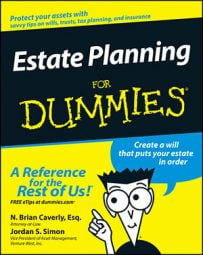Setting up a charitable trust to leave property to a qualified charitable organization can reduce your estate taxes similar to the way giving gifts to charitable organizations offers the charitable deduction to reduce gift taxes.
If you’re trying to reduce your estate by using a charitable remainder trust and specify your spouse to receive payments, you may be increasing the value of your spouse’s estate so much that estate taxes kick in or, if they already apply, they may be higher than they otherwise would be. As with all the other estate-related tax strategies, you need to think several moves ahead and discuss any foreseeable down-the-road complications with your accountant.
The two main types of charitable trusts are:
Charitable lead trust: You can use a charitable lead trust (a type of irrevocable trust) to make a series of payments (for example, an annuity of the same amount each year) to a charitable organization. At some point in the future, the remaining property in the trust:
Reverts back to you
Transfers to someone else that you specify, such as your spouse or your child
Charitable remainder trust: When you place property in a charitable remainder trust, your beneficiary receives a specified amount of money regularly for a period of time. After that period of time has elapsed, whatever is left over goes to the charity.
Instead of some finite period of time, you can set up a charitable remainder trust to cover the life of your beneficiary. When the beneficiary dies, the payments end at that point.
Many people set themselves up as the beneficiary who receives the payments from the trust, but you can also specify your spouse, your children, or someone else to receive those payments.
If you specify anyone other than your spouse or yourself to receive the payments from the trust, gift taxes most likely apply, unless the payments are under the $11,000 annual exclusion. The payments are considered to be a gift. (Gifts to your spouse don’t trigger the gift tax because those payments are treated the same way as if they were gifts with the unlimited marital deduction.)

